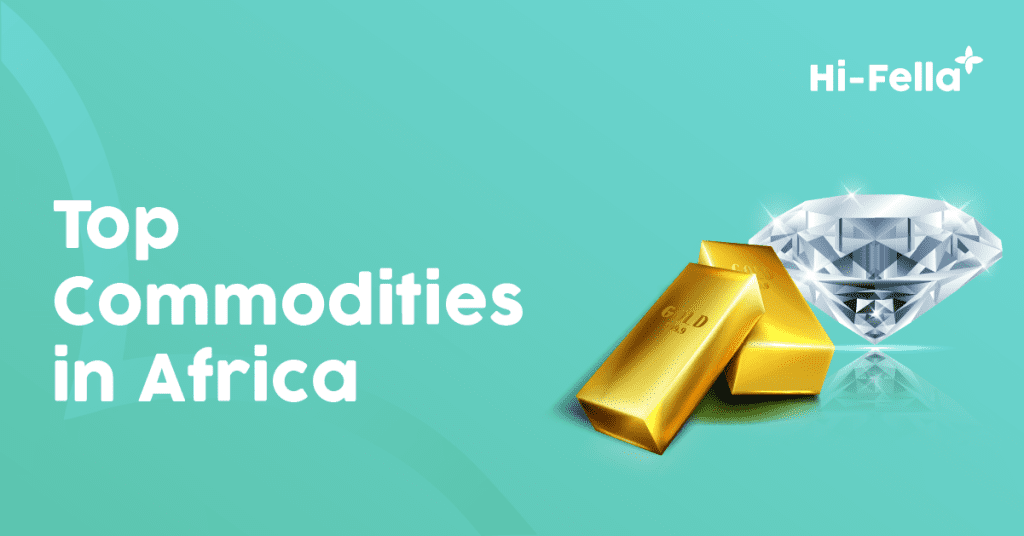Table of Contents
Africa, a continent of unparalleled diversity and rich resources, has long been a focal point of interest for global trade. Its vast landscapes and varied climates have given rise to a wealth of commodities that hold immense potential in the international marketplace. From precious minerals to agricultural treasures, Africa offers a bounty of natural resources coveted by industries worldwide. Explore Africa’s key commodities. Discover investment opportunities and economic insights in this resource-rich continent.
Top commodities in Africa
Africa’s major exports include oil, minerals, agriculture, and natural resources. Three of the top commodities in Africa are cocoa, gold, and crude oil. Africa is the leading continent that produces cocoa beans worldwide. In 2021 Africa exported approximately 7.39 billion U.S. dollars of cocoa beans, increasing from 2020 with only 6.20 billion U.S. dollars. For gold, in the same year the Central African Republic exported $47.6M in gold, making it the first most exported product in the Central African republic. For crude oil, Nigeria led the export in 2022. Nigeria exported nearly 1.4 million barrels of oil per day. Overall, approximately 4.8 million barrels per day exported from Africa in the same year.
Those top three commodities in Africa are fundamental to the continent’s economy. They contribute significantly to GDP, export revenues, and job creation in many nations. Moreover, these commodities have a far-reaching impact on the global market, with fluctuations in their supply, prices, or demand affecting global industries and economies. African oil and gas exports, for instance, form the backbone of many economies, while minerals and metals bolster foreign exchange earnings, and agricultural exports play a pivotal role in meeting global demand. Consequently, the fortunes of these commodities hold considerable sway over both African nations and the broader global market.
Policies and regulations
Since Africa consists of many countries, the policies and regulations regarding export can be different from one country to another. It is best for you as the exporter to research first about the policies and regulations in your home country and in your destination country.
Let us see South Africa as an example. In South Africa these are the main legislation that governs exports:
- The International Trade Administration Act No. 71 of 2002 (ITAA).
- The Customs and Excise Act No. 91 of 1964 (Customs and Excise Act).
- The Non-Proliferation of Weapons of Mass Destruction Act No. 87 of 1993.
- The National Conventional Arms Control Act No. 41 of 2002.
- To send specific items out of South Africa, you need permission. This is to follow the rules about what can be exported, especially as agreed in international agreements South Africa is part of.
The South African Reserve Bank predicts a 1.8% economic growth in 2023, while the World Bank expects 1.5% growth. Since 2023, they’ve been negotiating important trade deals with other countries.
- SACU-India PTA
A trade deal with India to reduce tariffs on specific goods. Negotiations involve sharing tariff requests. - SADC-EAC-COMESA FTA
South Africa is part of an agreement with 26 African countries to boost free trade. - AfCFTA
This will be the world’s largest free trade area, uniting 55 African countries. It aims to create a single market by allowing goods and services to move freely and enhance Africa’s global trade.
We can draw the conclusion that Africa as a continent is very rich in natural resources. The top commodities in Africa are cocoa, gold, and crude oil, but it does not rule out the possibility that other commodities will also become their superior products. The rules and regulations also support Africa’s nation to export more of their commodities. Africa’s opportunities to export their superior products abroad are very wide.
Ready to tap into Africa’s commodities and conquer the global market? Hi-Fella, an online platform where buyers and suppliers from around the world gather, is your gateway to seamless import-export operations. With only downloading the Hi-Fella app on Play Store or App Store and signing up for an account, you can harness the potential of Africa’s riches for your international trade success! Join us today!








